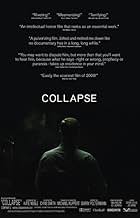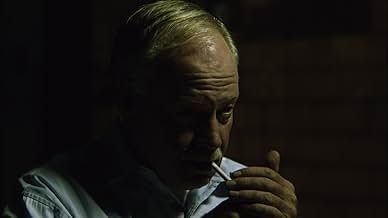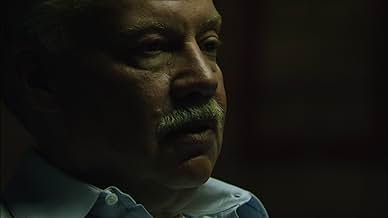Ajouter une intrigue dans votre langueA documentary on Michael Ruppert, a police officer turned independent reporter who predicted the current financial crisis in his self-published newsletter, From the Wilderness.A documentary on Michael Ruppert, a police officer turned independent reporter who predicted the current financial crisis in his self-published newsletter, From the Wilderness.A documentary on Michael Ruppert, a police officer turned independent reporter who predicted the current financial crisis in his self-published newsletter, From the Wilderness.
- Réalisation
- Scénario
- Casting principal
Avis à la une
1. Ruppert discounts human ingenuity.
Having the benefit of the internet and the ability to research, you will find that even generous estimates tell us that any new power grid would take 30 years to establish. This means that if aliens came down to earth and gave us a perfect technology that required no input and had zero emissions it would still require a lot of oil and time to build an infrastructure to support it. The fact is oil has artificially increased our carrying capacity and when its gone, the excess population will go with it. The standard of living we all have come to demand will likely never return and certainly not for 7+ billion people. (not that we all have Hummers and flat screens now)
2. The San Francisco (chronicle?) lauds the moment Ruppert cries because they think he is lamenting the fate of humanity.
I think it's highly likely, and more compelling to look at the beginning of the documentary where he says he's lost his fiancé to betrayal and only has his dog, the beach, and this movement to get him by. He's crying because he thinks it will take a community to survive in the aftermath of the collapse, and he has no loved ones.
But the real element that grabs you is Smith's subject. Ruppert will be seen by some as a prophet and by others as a nutcase but he has a magnetism on screen that is undeniable. This ex-cop is well-spoken it is very obvious that he has given conferences and presentations as he begins to explain his theories.
The main point Ruppert is trying to get across is undeniable. Our planet has finite resources which will not be able to sustain our current way of life indefinitely. But Ruppert's actual discourse will never be confused with a green activist as he veers constantly into subjects such as peak oil, politicians and banks. Where Ruppert is more questionable is when he mixes opinions with facts.
Ruppert repeats that he is not a conspiracy theorist yet often acts like ones. He constantly cites people, studies and historic events that favors his point of views and ignores the rest. These are old techniques that have been used by countless gurus, theorists and leaders and Ruppert does it very effectively.
This mix of truth and speculation works because the part that is truth is monumentally percussive: We as a species will not be able to live this way forever.
Ruppert posits that the system is crashing down fast but you don't have to believe this to enjoy this documentary. He interprets all sorts of world events as symptoms and yet again, you can take it or leave it. He claims he has been shot at and that US presidents have taken a personal interest in him without offering any evidence and you can discard this. He makes a compelling argument that alternative energies we are exploring are not sustainable/viable in their actual form but you can choose to disagree. He lashes at the deficiencies of globalization and you could ignore that too.
What you can't ignore is that change will have to happen. Smith seems confident that the audience will make up their minds about Ruppert and his theories. You do not have to share Ruppert's quasi-apocalyptic vision of the future to have a great time watching this.
Despite the praise, Collapse is not without a few flaws. I wished more time had been devoted to questioning Ruppert's wilder claims. Shot at? When? Where? Who? I also thought Ruppert's angle was too focused on the US and would have loved to hear his opinion on China and a few other things.
But overall, this is a nice documentary with an air of political thriller to it. Whether it is academic or objective, is left for each viewer to decide.
I would surely say - the most important movie for the 21st century man.
We live in a fairytale where everybody has a hope that the ''good'' will overcome the ''evil'' no matter how bad it is, because it will be better... in the end that's the way fairy tales end, don't they? The ugly truth is that no magical wonderland exists, there is only now and here and this movie shows you WHAT ACTUALLY IS NOW AND HERE.
All of his concerns are true, and some are even worse than he stated, but the very worst problem of all didn't even get a mention from him....that of global overpopulation that is the root cause of all the symptoms of our existence troubles that he did state.
To simplify......if the world's population was 20% of what it is now, the maximum sustainable figure, all of Ruppert's concerns for human existence would not be crucial for thousands more years when real solutions to the problems he stated might be available. But, we cry about the symptoms and don't care one bit about the cause so we continue to overpopulate all countries with uncontrolled new births, and are continually overburdened with resultant and mostly unsolvable problems as a result. Air, water, oil, food, and every single other problem of today that Ruppert stated has been caused by overpopulation, but still we cry only about symptoms, as Ruppert does, instead of the root cause of all our global problems....too many people being born with no controls on it and, what is much worse, no gov't or societal thought even being given to it.
As a result of that typical human stupidity and shortsightedness we are done, people, it is just a matter of time, and not that much time either, as your own young grandchildren will suffer badly as a result. But, still you don't care, so nothing is ever done about it. We don't deserve any more time on earth if we don't even care enough about protecting our continued existence by working on the cause of all of our problems.
Essentially what this film does is the equivalent of getting stuck at a bus stop listening to a guy who is convinced that the world is going to come to an end and that "they" are just keeping us in the dark for some reason. I don't mean this as negatively as it sounds but it is fair to say that this film doesn't hide the fact that at times Ruppert gets carried away with himself, doesn't always cope well with having the totally open stage that he has in the interview, gets passionate, is obsessive and does happen to make statements that (out of context) come off as paranoid and doomsday in nature. It is also fair to say that, unless you already share his mindset, that there will be several times during the film where he goes further than you will be willing to go or says things that either don't make sense, seem like a stretch or that you just plain disagree with.
Mostly the film lets him talk so it is only fair that these moments are left in the film because it does let us see that, being frank, Ruppert is obsessive and that perhaps some of what he says is exaggerated and extreme but this is not to say that he is 100% wrong. So while I personally don't agree with him on the imminent nature of the collapse of the oil reserves (or that they are significantly smaller than "they" are telling us), one cannot really argue that from plastics to fuel, we really have put all our eggs into the "oil" basket and that supplies are simply not infinite. Likewise, because all of our eggs are in one place, moving them may well be possible in small numbers but if we suddenly have no basket – we're going to have a load of broken eggs. At this level the film is engaging and provides plenty to think about and I think that Ruppert is at his best when he is talking generally because his basic points are hard to argue; it is only when he gets into specifics or gets tied up in details that he begins to say "they" too often or get a bit more emotional.
These moments hurt the film by hurting him, although in fairness since the documentary is technically about him, then it is all part of the film and is a good bit of balance. So yes, Collapse will lose you at some point but it will also engage you at many more; it isn't the most factual of documentaries nor is it the best in terms of structure but I found it mostly very engaging and it sent me onto news sites and opinion sites on the internet to read up on some of the less "opinion" related "facts" that it Ruppert presents. Worth seeing for its faults because it is engaging and provides much to think about, even if your conclusions may not lie as far out there as Ruppert's.
Le saviez-vous
- AnecdotesAccording to director, Chris Smith, they initially agreed the primary subject was supposed to be the CIA's connections to drug smuggling within the Iran-Contra affair, specifically Ruppert's collaboration with Pulitzer Prize-winning reporter Gary Webb's mid-1990's investigative series, "Dark Alliance." But Ruppert didn't want to talk about the CIA. Instead, he wanted to talk about peak oil, and its critical implications for the future.
- Citations
Michael Ruppert: It's kind of sad because we as a species have become so disconnected from the Earth. We don't have any real contact with the Earth. We don't have any sense of its functions, its feeling, its seasons, its timings.
- ConnexionsReferenced in Film Junk Podcast: Episode 235: TIFF Report, Part 1 (2009)
- Bandes originalesCollapse
Performed by Karli Larsen, Didier Leplae, Joe Wong
Meilleurs choix
- How long is Collapse?Alimenté par Alexa
Détails
Box-office
- Montant brut aux États-Unis et au Canada
- 46 964 $US
- Week-end de sortie aux États-Unis et au Canada
- 7 800 $US
- 8 nov. 2009
- Montant brut mondial
- 46 964 $US
- Durée1 heure 22 minutes
- Couleur
Contribuer à cette page



















